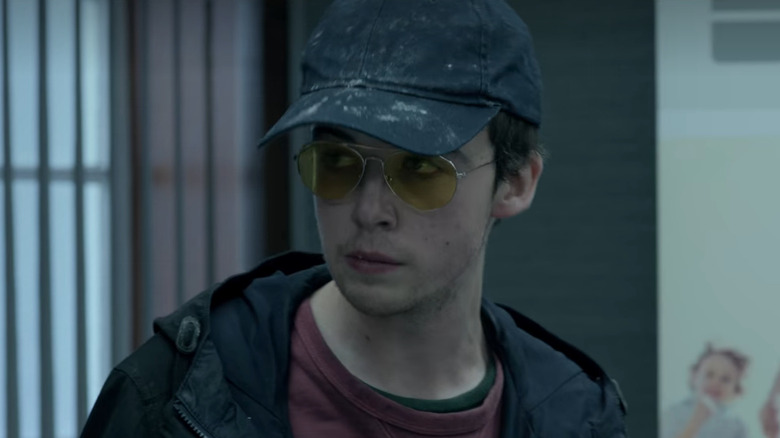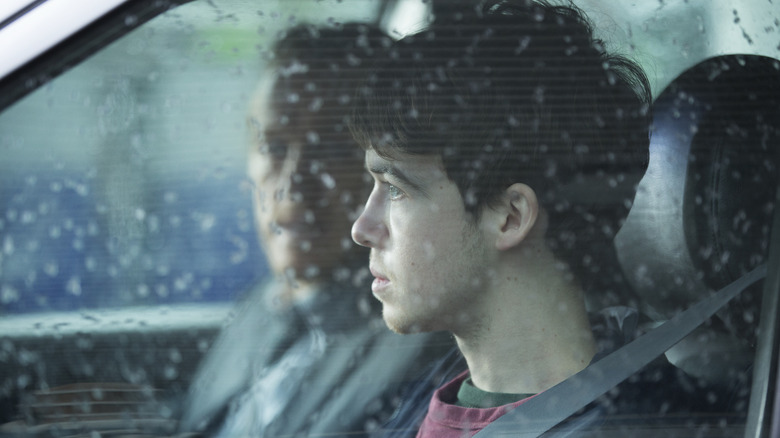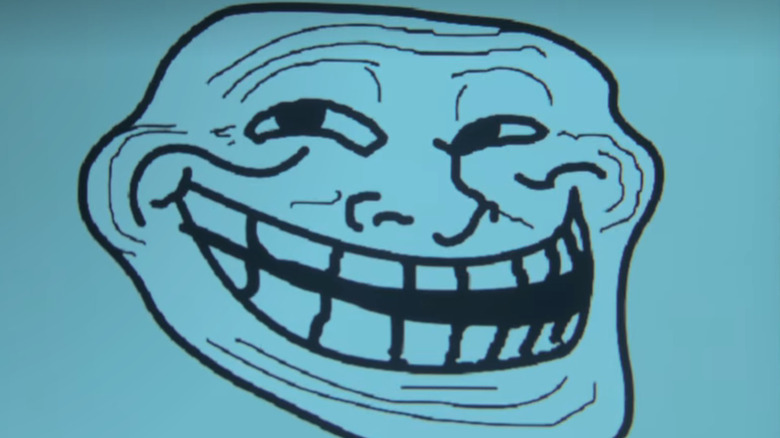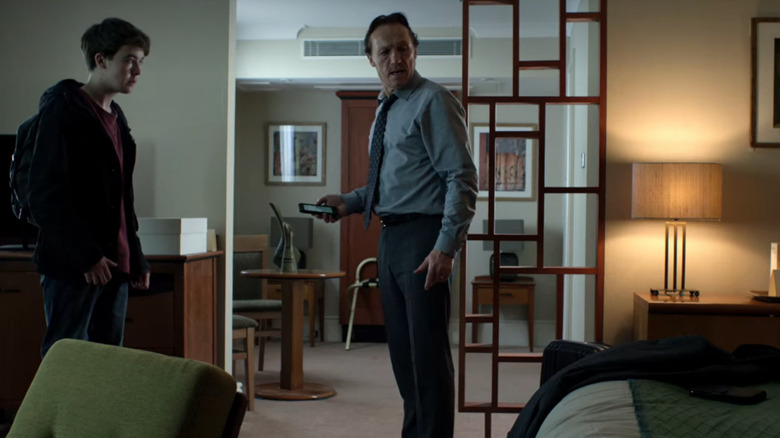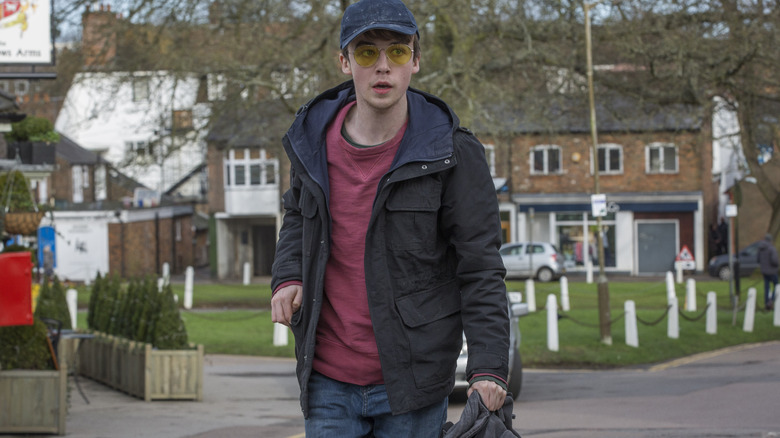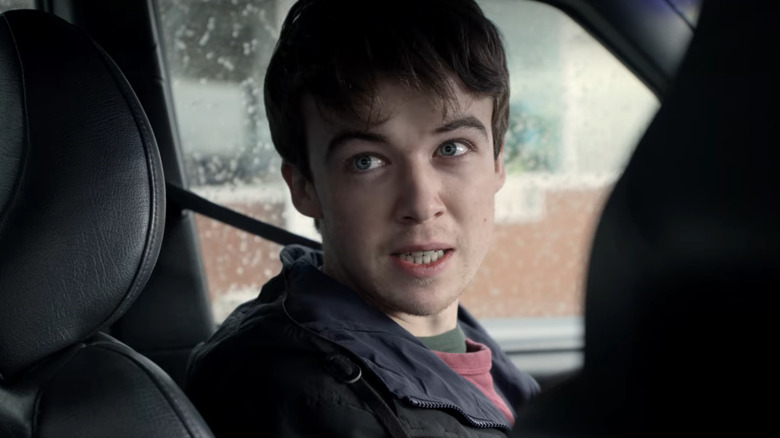Black Mirror: What Was The Point Of The Shut Up And Dance Episode?
One of the recurring themes of "Black Mirror" is how we, as a society, punish those who we consider to be morally bereft or bankrupt. While this aspect has been a key part of several memorable episodes in the anthology series, including "White Bear," "Hated in the Nation," and "White Christmas," perhaps the most chilling exploration of this notion in the series comes in "Shut Up and Dance."
The premise of the episode is introduced when Kenny (Alex Lawther), a teenage boy, masturbates in front of his computer, only to receive a message from a hacker who threatens to expose him if he doesn't follow their instructions. While masturbation is hardly a crime, it's easy to see how a teenager might find almost anything embarrassing enough not to want it to come out in public.
Still, the hackers are pulling the strings of many other people with secrets to keep them in line in "Shut Up and Dance," and in true "Black Mirror" fashion, things only get nastier as the story goes on. However, as the episode reaches its dark and bloody conclusion, the hackers simply send a troll meme to all of the participants, revealing their secrets anyway and suggesting a very nihilistic overall point to the proceedings.
Kenny isn't the hapless victim that he appears to be
Though the reveal at the end of "Shut Up and Dance" comes as a brutal shock to most viewers, there are hints throughout this "Black Mirror" episode that things are not quite what they seem. While, as we pointed out above, it's understandable for a teenager to think that a video of them masturbating could kill their reputation, Hector (Jerome Flynn) even points out to Kenny that he hasn't really done anything wrong.
This is one of many moments in the episode that let Alex Lawther's facial acting do all of the heavy lifting. The haunted look on his face shows that there's more to the story but that he dares not reveal this to anyone — even someone else who is also being blackmailed — lest they find out about his secret shame.
Despite the unspeakable crime that Kenny has committed in "Shut Up and Dance," audiences can be forgiven for still feeling a bit sorry for him, as the writing and direction behind this "Black Mirror" episode are so effective at muddying the waters, morally speaking. Though all of the people being blackmailed have done bad things, as with "Hated in the Nation" and "White Bear," we're left questioning what kind of moral ground those doing the punishing are standing on and whether the sentence really fits the crime here.
Trauma bonding for guilty souls
As with any situation that sees two people from very different walks of life becoming unlikely allies, the bond between Kenny and Hector is ultimately the heart of the episode. Though both have done things that they are ashamed of and would rather keep secret, it's easy to feel some sympathy for the two men before the big reveal at the end of "Shut Up and Dance," as they appear to just be weak-willed people who have slipped and are now paying heavily for it.
Though the major points of this "Black Mirror" episode are pretty nihilistic, the friendship between these two compromised men does offer a window in for the audience that helps viewers to inevitably parse out and dissect the disturbing subject matter that is revealed as the episode comes to a close. After all, Kenny is a much more relatable character before it is confirmed that he had been watching child pornography. By the time he (very reluctantly) beats a man to death to ensure his secret stays safe, Kenny is a changed person.
Furthermore, as Hector doesn't know Kenny's secret, he sees him as just a poor kid who's in over his head. This does naturally make the hammer drop that comes at the end that much more effective.
A cautionary tale but perhaps also a warning
Like "Luther: The Fallen Sun," this look into the "Black Mirror" focuses on how easily people can be manipulated when they feel shame and fear that this shame might be made public. While "Shut Up and Dance" doesn't go quite as far with this premise as Netflix's "Luther" film does, it gets plenty brutal enough over the course of its runtime to leave viewers feeling deeply unsettled.
Perhaps its best trick, however, is fooling the audience into thinking its skinny, nervous young protagonist is only guilty of what we saw him doing. This makes the gut punch that comes at the tail end of the episode, that Kenny was pleasuring himself to child pornography, hit like a truck. It's also one of the best instances of what the titular "Black Mirror" can hide in its depths.
For those who are unaware, Charlie Brooker's series is named for the screens of our phones, televisions, and monitors that we spend so much of our time staring into. However, when we ultimately find ourselves alone, what is it we're looking at when we think no one else is paying attention? This appears to be another grim question at the heart of "Shut Up and Dance."
Things look especially grim for Kenny in the end
While all of the characters who are being blackmailed in "Shut Up and Dance" are ultimately exposed for their wrongdoings despite complying with the trolls' demands, it's Kenny who faces the worst of it in the end. Not only do his friends and family now know that he watches pornography featuring minors, which is in and of itself a criminal offense. He will also very likely be implicated in both the bank robbery and murder he committed while following the trolls' instructions.
Though Kenny may look young due to his slight build, awkward demeanor, and youthful face, many sources have written explicitly that Kenny is 19 years old, meaning he will be tried as an adult in England, where he lives. If this is indeed the case, Kenny may be one of the most pitiful characters in all of "Black Mirror," having ruined his life three times over in only a single day and with nothing to show for it but what looks to be a lifetime in prison.
How civil are humans when they're backed into a corner?
As we mentioned at the top, "Black Mirror" has a penchant for stories like the one told in "Shut Up and Dance." For instance, "White Bear" similarly cast a hapless young woman into a horrendous nightmare where she is tortured every single day, only for audiences to again lose much of their empathy for her once her crime of child murder comes to light. Meanwhile, "Hated in the Nation" had people voting on who should die every day as automated bees followed the whims of the public and the daily scandals of the press.
Still, as many ages and societies of human culture have shown, humanity has a nasty predilection for going to very extreme lengths to punish wrongdoers. Perhaps the ultimate point of "Shut Up and Dance" then is that as much as we think we've evolved as a species, our basest instincts are never far away. Much like "Yellowjackets," the episode shows how illusions like civilization can fall away in the wake of a crisis.
While few episodes of "Black Mirror" end on what could be called a happy note, for these reasons, "Shut Up and Dance" is especially grim, even if it is ultimately one of the best and most thought-provoking episodes in the dystopian science fiction series.
